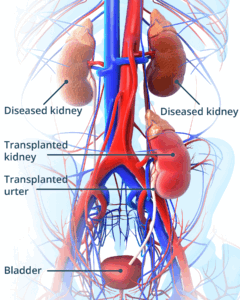What to Expect Before, During, and After a kidney transplant
A kidney transplant is a life-changing procedure that can dramatically improve the quality of life for those with end-stage kidney disease. While the process may seem daunting, understanding what to expect before, during, and after the transplant can help alleviate concerns and prepare you for the journey. Here’s an overview of the key stages in the kidney transplant process:
Before the Transplant: Preparation and Evaluation
The road to a kidney transplant begins with thorough medical evaluation. Your healthcare team will assess your overall health to ensure you’re fit for surgery. This includes blood tests, imaging studies, and an evaluation of your heart and lungs to determine your suitability for the transplant. You’ll also undergo a psychological evaluation to ensure that you are emotionally prepared for the procedure and the recovery process.
One crucial step is finding a suitable donor. Kidney transplants can be from living donors, such as family members or friends, or from deceased donors. Once a match is found, the transplant center will schedule the procedure. It’s important to be aware of the waiting period for a donor kidney, which can vary based on factors like blood type and tissue compatibility.
During the Transplant: The Surgery Process
The kidney transplant surgery itself typically takes between three to four hours. You will be placed under general anesthesia, so you won’t feel any pain during the procedure. The surgeon will remove the diseased kidneys (if necessary) and implant the new, healthy kidney into your lower abdomen. The new kidney is usually connected to your blood vessels and bladder to begin functioning.
During the surgery, the medical team will monitor your vital signs closely to ensure that there are no complications. The transplant procedure is generally successful, but, like all surgeries, it does carry some risks, including infection, bleeding, and organ rejection.

After the Transplant: Recovery and Lifelong Care
After the transplant, you will spend several days in the hospital, typically in an intensive care unit (ICU), to monitor your kidney’s function and ensure there are no immediate complications. Your doctors will assess the transplanted kidney’s ability to produce urine, a good sign that it’s functioning properly.
Once you’re stable, you’ll move to a regular hospital room. During your recovery, your healthcare team will work with you to manage pain, prevent infection, and monitor for potential issues like organ rejection. Rejection is a risk in any transplant, and you will need to take immunosuppressive medications for the rest of your life to prevent your body from attacking the new kidney.
Long-Term Care and Lifestyle Adjustments
In the months following the transplant, regular follow-up appointments will be necessary. These visits allow doctors to monitor the kidney’s function through blood tests and imaging. Your immunosuppressive medications will need to be adjusted over time, and you’ll need to stay on top of your health to ensure the long-term success of the transplant.
You’ll also need to make some lifestyle changes, including following a kidney-friendly diet, staying active, and avoiding infections. While the recovery process can take several months, many people go on to live healthy, active lives after a kidney transplant.
Learn more about how to keep your kidney healthy.
Conclusion: A New Beginning
A kidney transplant can offer a new lease on life, providing relief from the limitations of kidney failure and dialysis. While the process can be challenging, with proper preparation, support, and care, a kidney transplant can significantly improve your health and quality of life. Always consult with your medical team to fully understand the process and the steps you need to take to ensure the best possible outcome.
